|
|
| Sei in: Cinema e Medioevo ® Indice alfabetico dei film |
ONIBABA - LE ASSASSINE
(Onibaba)
1964, regia di Kaneto Shindô
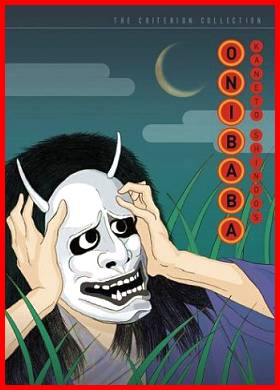
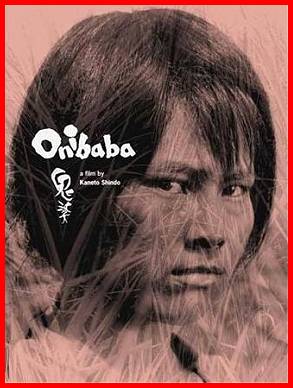
Scheda: Nazione: Giappone - Produzione: Kindai Eiga Kyokai, Tokyo Eiga Company - Distribuzione: Regionale, Toho Company, The Criterion Collection, International Film Distributors, Something Weird Video, Connoisseur Video - Soggetto: Kaneto Shindô - Sceneggiatura: Kaneto Shindô - Fotografia: Kiyomi Kuroda - Montaggio: Kazuo Enomoto - Musiche: Hikaru Hayashi - Formato: Tohoscope, B.N. - Durata: 103'.
Cast: Nobuko Otowa, Jitsuko Yoshimura, Kei Sato, Jukichi Uno, Taiji Tonoyama, Somesho Matsumoto, Kentaro Kaji, Hosui Araya.
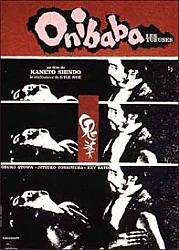
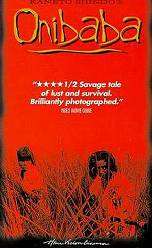
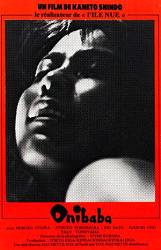
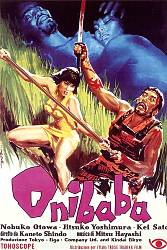
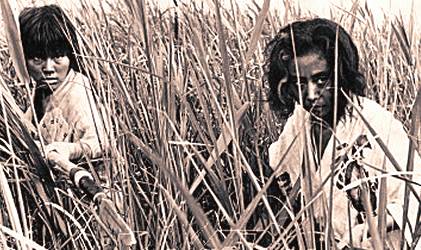
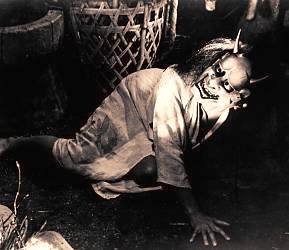
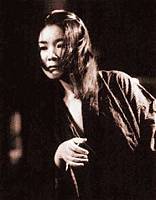
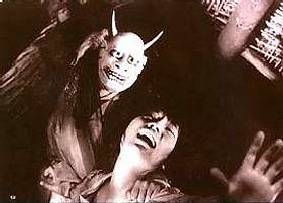
![]() Trama e commenti: mymovies.it
- film.spettacolo.virgilio.it - kamikazen.com - it.movies.yahoo.com - kataweb.it:
«Ispirato a un'antica leggenda e ambientato in un periodo imprecisato del corrusco medioevo giapponese, è il dramma di due donne, suocera (N. Otowa) e nuora (J. Yoshimura), che cercano di sopravvivere a una guerra in corso uccidendo i soldati feriti e spogliandone i cadaveri finché tra le due s'intromette, scatenandone la gelosia, un disertore (U. Jukichi). Nel descrivere, in toni ora favolistici ora allegorici, un'umanità abbrutita, ridotta alle elementari leggi della sopravvivenza, Shindo (1912), cineasta progressista e accademico della regia, intende denunciare la guerra e inneggiare ai diritti dell'amore contro la superstizione, ma lo fa in modi enfatici e artificiosi. Il suo lirismo pompieristico si risolve in una lubricità (sesso, violenza, morte) accademicamente ostentata. Nella sua efebica grazia Yoshimura è una presenza femminile memorabile...».
Trama e commenti: mymovies.it
- film.spettacolo.virgilio.it - kamikazen.com - it.movies.yahoo.com - kataweb.it:
«Ispirato a un'antica leggenda e ambientato in un periodo imprecisato del corrusco medioevo giapponese, è il dramma di due donne, suocera (N. Otowa) e nuora (J. Yoshimura), che cercano di sopravvivere a una guerra in corso uccidendo i soldati feriti e spogliandone i cadaveri finché tra le due s'intromette, scatenandone la gelosia, un disertore (U. Jukichi). Nel descrivere, in toni ora favolistici ora allegorici, un'umanità abbrutita, ridotta alle elementari leggi della sopravvivenza, Shindo (1912), cineasta progressista e accademico della regia, intende denunciare la guerra e inneggiare ai diritti dell'amore contro la superstizione, ma lo fa in modi enfatici e artificiosi. Il suo lirismo pompieristico si risolve in una lubricità (sesso, violenza, morte) accademicamente ostentata. Nella sua efebica grazia Yoshimura è una presenza femminile memorabile...».
![]() Plot Summary, Synopsis, Review: IMDb - entertainment.msn.com
- tvguide.com -
dvdtimes.co.uk
- www.allmovie.com
- deutsches-filminstitut.de -
emmanuel.denis.free.fr - criterion.com
- en.wikipedia.org:
«...In the time of civil war between samurai armies, a woman and her daughter-in-law live in a small hut in a susuki swamp. They make a living out of scavenging and selling armour from dead samurai, many of whom they murder themselves.
The younger woman begins a relationship with a man who lives nearby, and cannot resist sneaking out to visit him at night. Her mother-in-law tries to stop the relationship by playing on her fears of ghosts and punishment for sins of the flesh.
Onibaba is notable for its setting in a sea of susuki grass, its taiko drum soundtrack, and its grisly conclusion.
The story takes place shortly after the Battle of Minatogawa, which (despite the optimism the older woman displays) began a period of over 50 years of civil war, the Nanboku-chō period (1336 to 1392).
The demon mask used in the movie inspired William Friedkin to use a similar design for the makeup in subliminal shots of a white-faced demon, commonly known as Captain Howdy, in the 1973 horror film
The Exorcist».
Plot Summary, Synopsis, Review: IMDb - entertainment.msn.com
- tvguide.com -
dvdtimes.co.uk
- www.allmovie.com
- deutsches-filminstitut.de -
emmanuel.denis.free.fr - criterion.com
- en.wikipedia.org:
«...In the time of civil war between samurai armies, a woman and her daughter-in-law live in a small hut in a susuki swamp. They make a living out of scavenging and selling armour from dead samurai, many of whom they murder themselves.
The younger woman begins a relationship with a man who lives nearby, and cannot resist sneaking out to visit him at night. Her mother-in-law tries to stop the relationship by playing on her fears of ghosts and punishment for sins of the flesh.
Onibaba is notable for its setting in a sea of susuki grass, its taiko drum soundtrack, and its grisly conclusion.
The story takes place shortly after the Battle of Minatogawa, which (despite the optimism the older woman displays) began a period of over 50 years of civil war, the Nanboku-chō period (1336 to 1392).
The demon mask used in the movie inspired William Friedkin to use a similar design for the makeup in subliminal shots of a white-faced demon, commonly known as Captain Howdy, in the 1973 horror film
The Exorcist».
![]() Approfondimenti: Movie
Review
Approfondimenti: Movie
Review